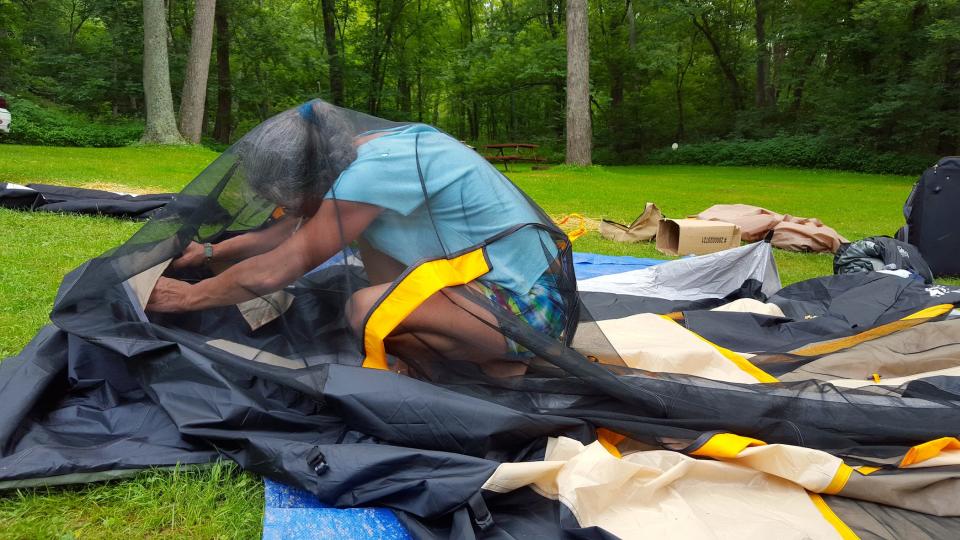Happy campers: Don’t let a leaky tent turn your memories into a ‘sop story’
It’s a Friday morning on a holiday weekend. By the end of the day, the campgrounds along the Mohican River will burst at the seams with campers.
If it rains Friday night, by Saturday morning clotheslines will be draped with soggy sleeping bags and bedding.
Chalk it up to inexperienced campers.
You could blame it on the equipment. As I’ve said many times, any tent can leak; cheap tents WILL leak. Regardless, human error is the main cause.
Airstream or tent? Glamping sites are ramping up across the US
How to stay dry in your tent while camping?

With that in mind, I’ll once again offer advice on how to keep yourself and your stuff dry inside your tent. That can be especially rewarding when your campground neighbors are bailing rainwater out of their tents and trying to wring gallons of water from their sleeping bags. And teaching their kids a few new expletives.
Being a happy camper — or a gloating camper — boils down to two things: Tents and tarpage. (My longtime canoeing buddy Joe Hughes coined that term.) You need to learn to get the most from your tent.
It all comes down to knowing what gear works best for you — and knowing how to store it, maintain it, and set it up.
What you should know about tents
Think of your tent as an investment in happiness. You get what you pay for. Determine what size you need, then research brands and models. Quality tents cost $500 or more. Larger ones run in the four figures.
If you wait for a new model to come out, you can save a bundle by buying the discontinued one. (Case in point, MSR recently came out with an improved Hubba Hubba tent, so I saved $200 last winter by buying the old model.)
For those who camp only once a year or less, or are on a tighter budget, cheaper tents can provide pretty decent protection from the elements. Just don’t expect to stay dry in a deluge.
Regardless, any tent will leak if it isn’t properly stored, maintained, and pitched.
After use, clean the grit, bird poop, and mud off your tent before putting it away. Turn the tent inside out and shake it out to make sure you didn’t leave any pets or small children in there.
Don’t fold the tent. Just crumple it loosely and pack it inside a large cloth bag made for that purpose.

If necessary, seal your tent seams with pliable sealer. Keep the zippers clean. An old toothbrush will do the trick. Or your roommate’s toothbrush.
When pitching your tent, always use a protective ground cloth to prevent abrasion to the floor. Never extend the ground cloth beyond the edges of the tent. If you do, the rainwater will pool under the floor and find its way to the heaviest object in the tent — your butt.
Also, pick your tent spot carefully. Avoid low-lying ground where water might flow or pool up.
Tarping your campsite? Watch out for wind gusts
You can always string a tarp over your tent for extra protection. Which is a good idea if you have a cheap tent. Also, a larger tarp that extends well beyond the tent provides a dry place to hang out when it rains.
Don’t just drape tarps over your tent. This compromises the fabric’s breathability. In effect, you’re creating your own little biosphere. Condensation from your breath will accumulate on the ceiling and rain down on you.
Hang your tarp so one corner is higher than all the others and the opposite corner is lowest. Obviously set it up to drain toward low ground.
Paracord works best for tying off tarps and can be purchased in adequate lengths to reach trees. I tie off two of the corners with taut-line hitches, to adjust tension. Tie down straps also work well for that purpose.
Gusting wind can tear the gromets out of your tarp. To prevent this, use bungees on two of the corners. Preferably heavy-duty rubber ones like truckers use.
Be a sport and give your waterlogged campground neighbors copies of the newspaper with this column. They’ll probably ignore my advice. At least they can use it to sop up the water inside their tents
This article originally appeared on Ashland Times Gazette: Tents and tarps: How to get the most from your camping experience

